What Happens If You Bury an Egg and a Banana? Unveiling the Surprising Results
Curious about an easy way to boost your garden’s health using simple kitchen scraps? If you bury an egg and a banana in your garden, you’ll create a natural, slow-release fertilizer that can enrich your soil and nourish your plants over time. As these organic products decompose, they release essential nutrients like nitrogen from the egg and potassium from the banana.
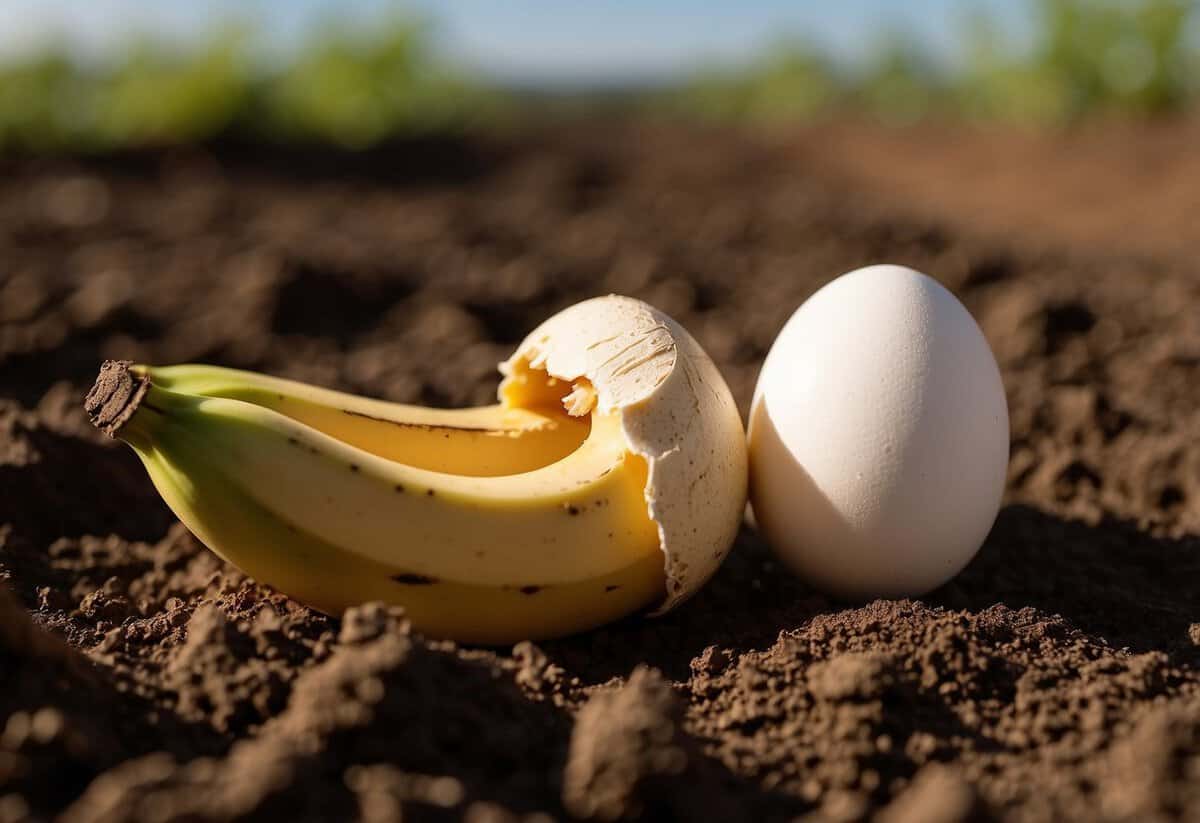
Your soil’s health is critical for plant growth, and adding organic matter like an egg and a banana can significantly improve soil quality. This method is a straightforward composting technique. By enriching your garden with these kitchen scraps, you’re leveraging nature’s processes to provide food for your plants.
Not only is this approach effective, but it also supports sustainable gardening practices. By recycling your leftover food, you reduce waste and promote a healthier garden ecosystem. So next time you’re in the kitchen, consider saving an egg and a banana for your garden.
The Process of Decomposition
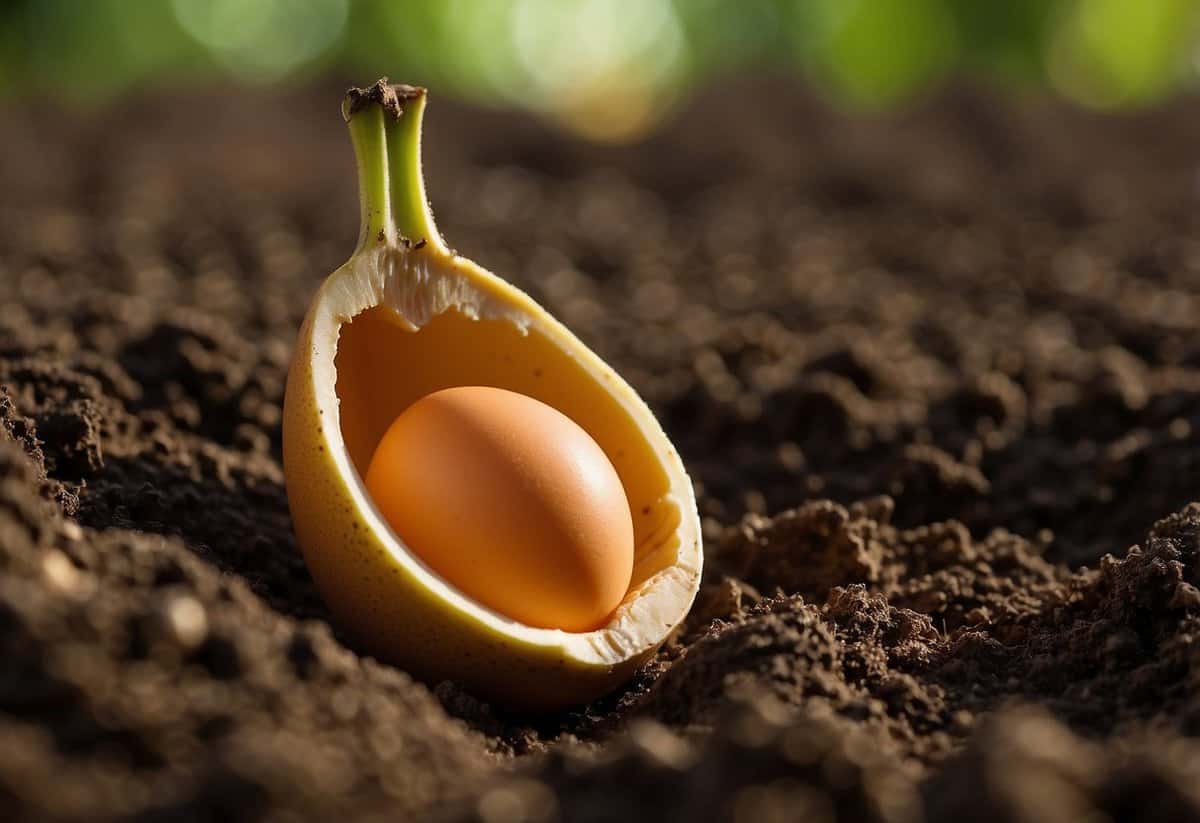
When you bury an egg and a banana peel, they decompose thanks to various processes. The breakdown provides nutrients to the soil and supports healthy plant growth.
Understanding Soil Microbes
Soil microbes play a crucial role in decomposition. When you bury an egg and a banana peel, bacteria and fungi start breaking them down. These microorganisms secrete enzymes that help decompose the organic matter.
- Bacteria are some of the first to attack the buried items. They break down the soft tissue of the banana peel and the proteins in the egg.
- Fungi come next, further breaking down complex carbohydrates.
The result is a release of nutrients like nitrogen, potassium, and phosphorus back into the soil. Water also plays a crucial role in this process, as it helps microbes thrive and aids in breaking down materials faster.
By burying organic waste like banana peels and eggs, you create compost that improves soil quality. This compost becomes rich in essential nutrients, making it an excellent natural fertilizer for your garden.
For more detailed information, you can explore the decomposition process of banana peels or learn about the stages of decomposition.
Benefits to Plants and Soil

When you bury an egg and a banana in your garden, you provide essential nutrients and improve soil quality. This simple method boosts plant growth by adding substances like potassium, calcium, and nitrogen to the soil.
Nutrient Cycling in the Garden
Eggs and bananas decompose over time, releasing nutrients that plants can use. Eggshells are rich in calcium, which strengthens plant cell walls and supports root development. The egg inside adds nitrogen, vital for leaf growth. Bananas contribute high amounts of potassium, which is essential for flower and fruit production, and phosphorous, which aids in root growth and energy transfer.
Calcium helps prevent issues like blossom-end rot in tomatoes. The potassium from bananas enhances plant resilience to diseases and increases water efficiency. Nutrient cycling is a natural and efficient way to provide these nutrients without chemical fertilizers.
Improving Soil Structure
Burying eggs and bananas improves soil structure by increasing organic matter. Decomposing eggs enrich the soil with nitrogen and phosphorous. This process attracts beneficial organisms like earthworms, which aerate the soil and improve drainage.
Bananas enhance soil potassium levels, making it more fertile. This helps create a balanced soil environment, promoting a healthy garden. The banana peel acts as mulch, keeping soil moist and preventing weeds. Mixing organic materials like eggs and bananas into your soil is an easy way to ensure a thriving garden.
For more information check out the benefits of burying whole eggs as fertilizer and burying an egg in your garden.
Eggshells and Bananas as Natural Fertilizers
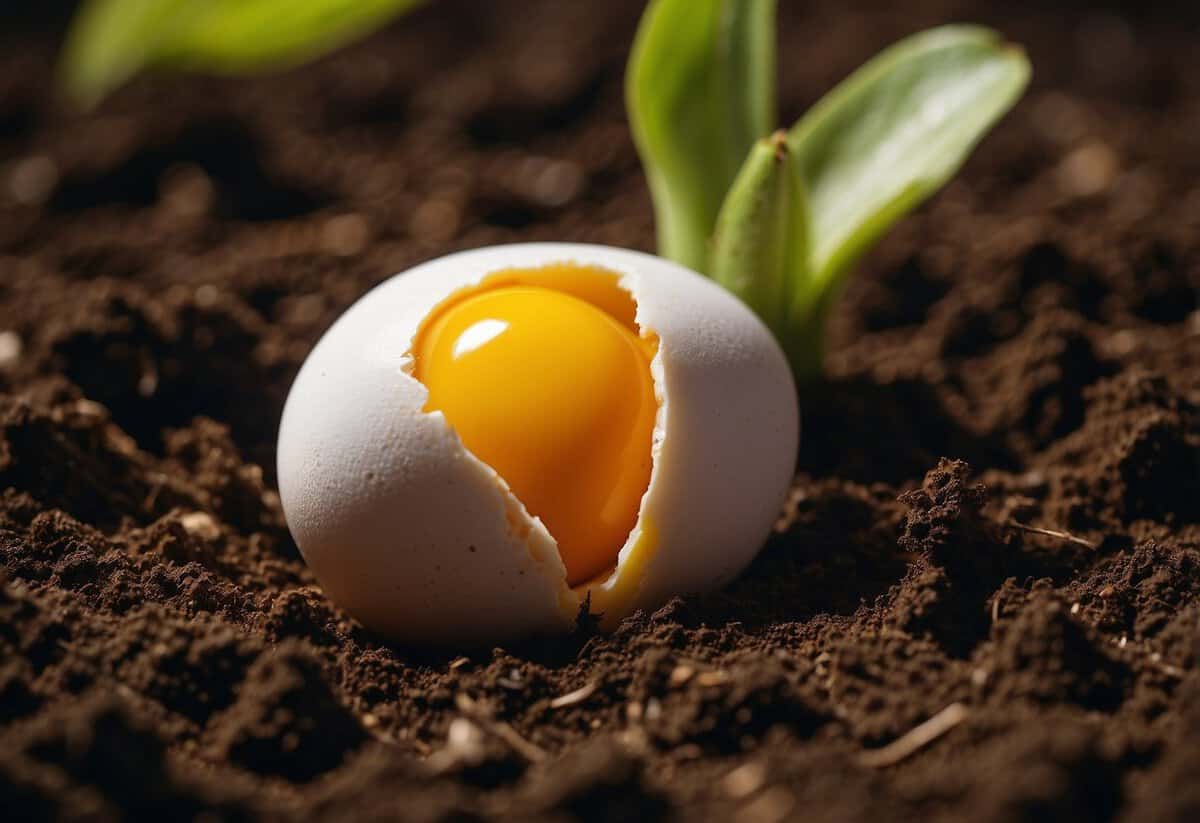
Using eggshells and banana peels in your garden can provide essential nutrients like calcium and potassium to your plants. These kitchen leftovers offer a simple, eco-friendly way to enrich your soil.
Comparing to Chemical Fertilizers
Eggshells contain high levels of calcium, which is essential for plant growth. Unlike chemical fertilizers, which may immediately release nutrients, eggshells break down slowly, providing a steady supply of calcium over time. This gradual release helps prevent calcium deficiency, which can cause issues like blossom end rot in tomatoes.
Banana peels are rich in potassium, an essential macronutrient that supports root development and overall plant health. Chemical fertilizers often provide potassium quickly but can harm the soil’s natural structure and microbial life with repeated use. Banana peels slowly decompose, releasing potassium and other nutrients, enhancing soil fertility naturally without negative effects.
In comparison, chemical fertilizers might show quicker results but can lead to long-term soil degradation and may introduce harmful chemicals into your garden. Natural fertilizers like eggshells and banana peels maintain the health of your soil while being environmentally friendly.
How to Use in Your Garden
To use eggshells, you should first sterilize them to avoid spreading bacteria. You can do this by heating them in the oven on low for a few minutes or microwaving them on high for 10 seconds. Then, crush the eggshells into small pieces and sprinkle them around your plants or mix them into the soil. The sharp edges can also deter pests like slugs and snails.
For banana peels, one common method is to chop them into small pieces and bury them a few inches below the surface of the soil near your plants. This allows them to break down and release their nutrients directly to the roots. Another approach is to compost the banana peels with other organic matter. This creates a rich, nutrient-dense compost that can be used throughout your garden.
Mixing crushed eggshells and banana peels into your garden soil regularly helps ensure your plants get a balanced diet of calcium and potassium. This natural method supports healthy plant growth, improves soil structure, and enhances your garden’s sustainability.
Potential Drawbacks and Precautions
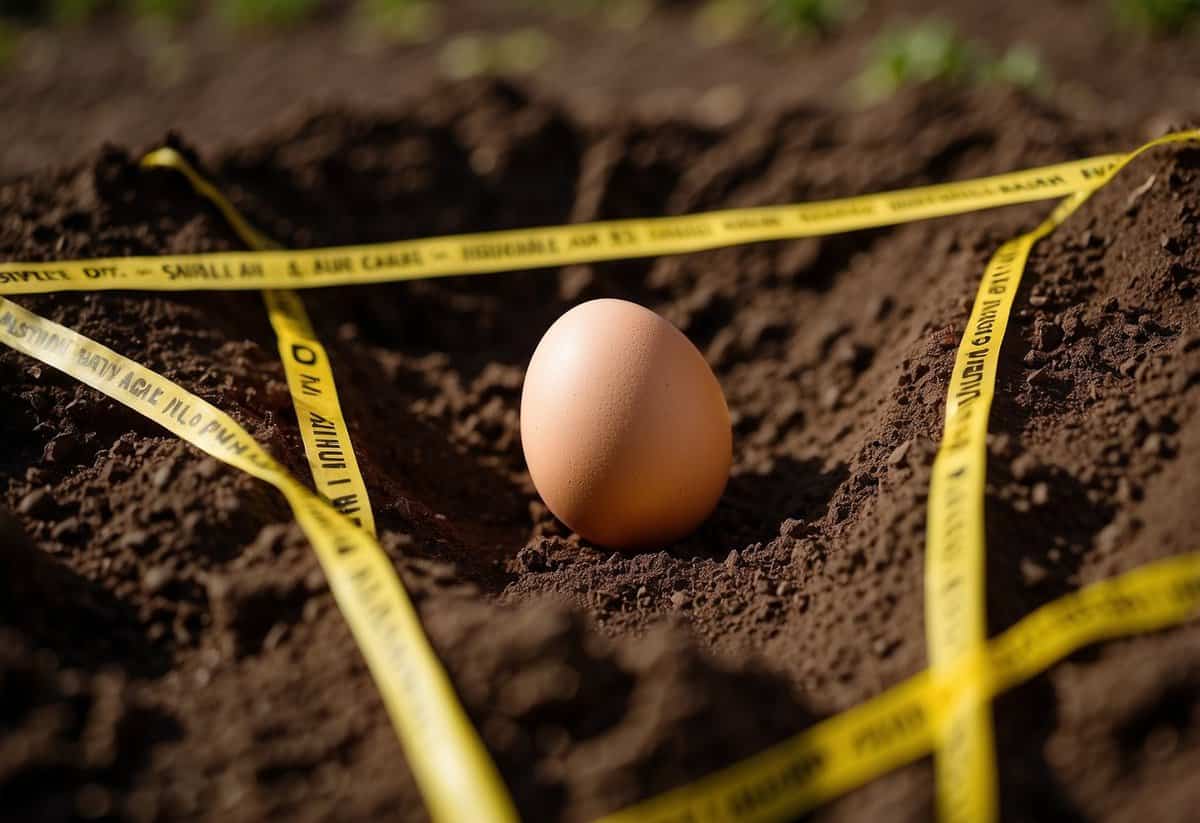
Burying an egg and a banana can help improve your soil, but it’s important to consider potential issues. These include attracting wildlife and controlling bad smells.
Attracting Unwanted Wildlife
Burying organic materials like eggs and bananas can attract unwanted pests. Rodents, raccoons, and other animals might dig up your garden.
To prevent this, bury the items deeply, at least 6-8 inches underground. Using a raised bed with a wire mesh at the bottom can also deter pests. Keeping the area clean and free of other food scraps will help.
Additionally, you can add a layer of mulch on top of your garden to hide the scent of buried materials. This extra step can make it harder for animals to locate the buried treats.
Controlling Offensive Odors
Decomposing eggs and bananas can create unpleasant smells. If not properly managed, this might impact your enjoyment of the garden.
To minimize odors, make sure to bury the eggs and bananas deeply. Mixing them with soil can speed up decomposition and help absorb smells. Regularly turning the soil can also help air it out, reducing any lingering odors.
You could also consider adding natural deodorizing elements to your garden, like lime or compost. These can help neutralize bad smells while also providing additional nutrients to your plants.
Incorporating into Composting Practices
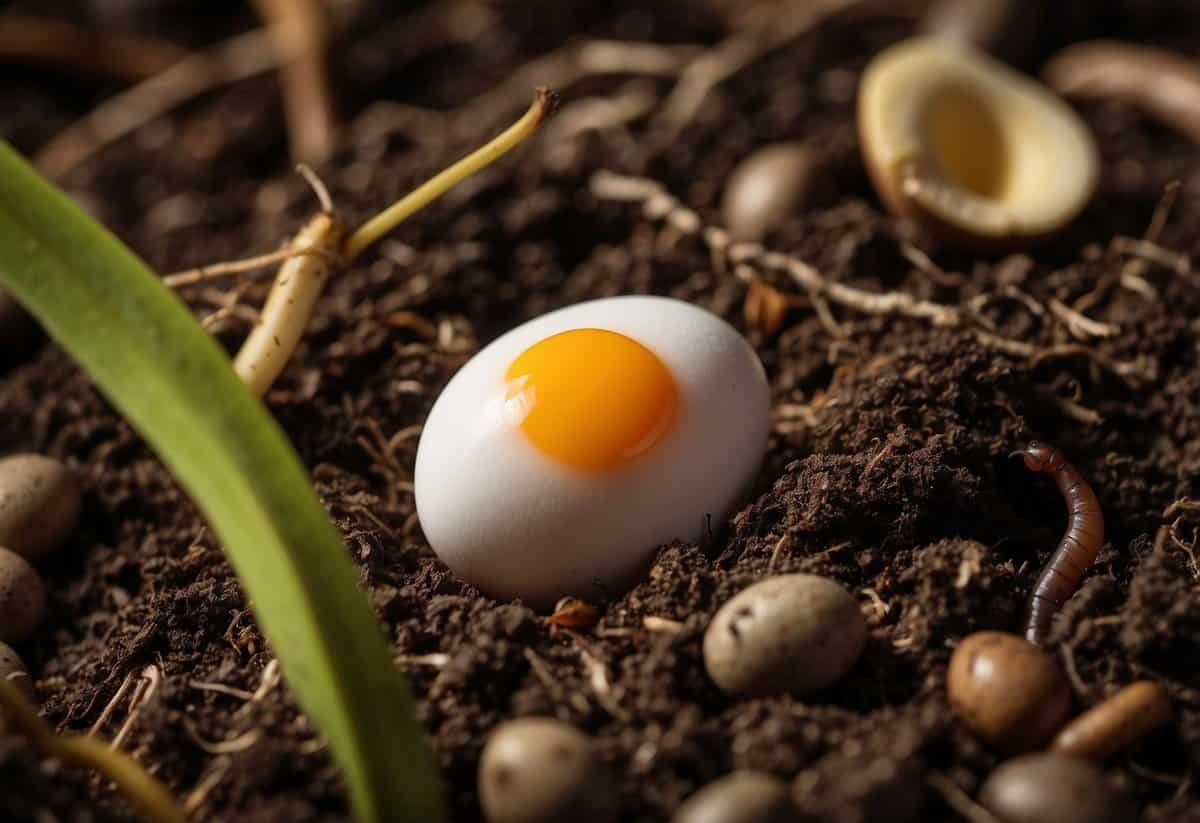
Incorporating eggs and bananas in your composting routine can boost nutrient levels and enrich your soil. However, it’s important to follow best practices to ensure a healthy compost pile.
Layering Your Compost
When adding eggs and bananas, start by creating layers. This helps in balancing the green and brown materials, which is crucial for an effective compost. Begin with a layer of dry leaves, then add kitchen scraps like banana peels and egg shells.
Egg shells should be crushed to speed up decomposition. Next, add a thin layer of coffee grounds, followed by more dry material. Avoid putting whole eggs in compost; they decompose slowly and can attract pests.
Banana peels, on the other hand, are excellent for the compost pile as they break down quickly and provide potassium. Always mix new layers with existing ones to enhance airflow and speed up the composting process.
Maintaining a Healthy Compost Balance
Balance is key for a productive compost pile. This means keeping the right ratio of green materials (like fruit peels and vegetable scraps) to brown materials (such as dry leaves and cardboard). You should aim for a ratio of about 2:1 brown to green.
Too much green material like kitchen scraps can make the compost wet and smelly, whereas excessive brown material can slow down decomposition. Turn the compost regularly to introduce oxygen, which aids in breaking down the organic matter.
Keeping your compost moist is also important. It should feel like a damp sponge but not soggy. Water occasionally if it dries out. By following these simple steps, you’ll ensure your compost pile remains healthy and effective.







